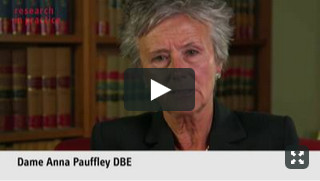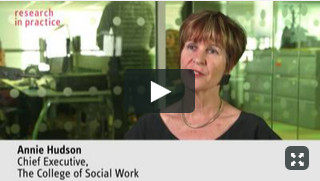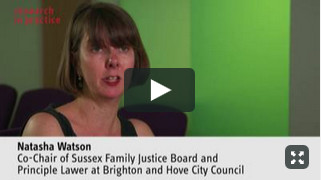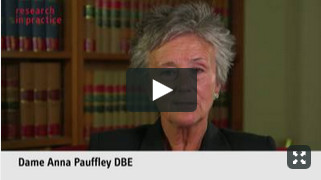 Contents
Contents
When is expert evidence necessary?
- local practice examples
- videos
- legal professionals discuss expert evidence and instruction of experts
- e-learning materials for this topic including self
- assessment tools for practitioners
What you need to know
 Mrs Justice Pauffley DBE on the use of expert evidence in the UK Family Court.
Mrs Justice Pauffley DBE on the use of expert evidence in the UK Family Court.
Running time: 01:34
Download video direct from Vimeo
Also viewable online via Adobe Connect
(having trouble playing our videos?)
- In the majority of cases, it is anticipated that sufficient evidence will be provided to the court by the local authority social worker and children’s guardian
- Children and Families Act 2014 (s13) – applies more stringent tests on the use of expert witnesses in care proceedings to streamline proceedings and reduce delay
- Expert assessments will only be agreed when this information is necessary in order to avoid delay for the child
- Expert/specialist assessments can be commissioned pre-proceedings provided that the parents/carers with parental responsibility consent. Legal advice should be sought prior to commissioning such assessments
- The expert must be advised that he/she may ultimately be required to provide evidence to the court
- The expert must be provided with a formal letter of instruction by the local authority (s3 of Practice Direction 24A Family Procedure Rules)
- Experts are bound by the duties owed by expert witnesses instructed in court proceedings.
 Social workers as experts in the Family Court – Annie Hudson, College of Social Work.
Social workers as experts in the Family Court – Annie Hudson, College of Social Work.
Running time: 02:57
Download video direct from Vimeo
Also viewable online via Adobe Connect
(having trouble playing our videos?)
Legal requirements
Expert evidence in children proceedings is governed by:
In addition, there is a series of applicable Practice Directions and Best Practice Guidance, which is discussed in detail below. The commissioning of expert evidence pre-proceedings is dealt with under What you need to know.
With regards to expert evidence, the Children and Families Act:
- prevents any person, including the local authority, instructing an expert without first obtaining the permission of the court (section 13(1)). As per previous procedures, failure to obtain permission from the court will mean that the evidence is inadmissible and may amount to a contempt of court
- establishes that rather than reasonably required to ‘resolve proceedings justly’ the court will now only give permission where the expert evidence is necessary to assist the court to resolve the proceedings justly (section 13(6)). The introduction of the necessity test is designed to reduce the amount of expert evidence commissioned.
When is expert evidence necessary?
When making a decision on whether or not to give permission the court will consider a number of factors:
- The court is only likely to allow an expert to be instructed where their evidence will be imperative for the just determination of the proceedings, and cannot be provided by the social worker, children’s guardian or any other party to the proceedings (see Re H-L (A Child) [2013] EWCA Civ 655; http://www.bailii.org/ew/cases/EWCA/Civ/2013/655.html).
Because social workers have a key role to play in the court process, they need to ensure that they have the confidence and expertise to give evidence[1]. Evidence presented for court needs to be underpinned by a robust evidence base rather than being based on personal judgement and intuition[2] (see the topic Evidence-based Assessments for further support). The curriculum guide for continuing professional development sets out the key areas for learning and development in pre-proceedings work and in court related skill. Core skills include:
- a good understanding of child development and the impact of abuse/neglect on this
- an understanding of effective, evidence based interventions and how they can be used with families
- assessment and analytical skills
- producing high quality social work statements, chronologies and court reports
- giving oral evidence in court
- refining the case analysis if new information comes to light[3] .
Download as a PDF: v1_tools_munro_areas-of-a_social_workers_expertise_300514.pdf
The delivery of high quality assessments by social workers is important to ensure the court has the necessary information to resolve proceedings. Shortcomings in assessments can occur because information has not been collected, because the information has not been analysed well enough to formulate an effective action plan or because there is a lack of reference to research or theory. Poor assessments are also consistent features in cases of severe injury or death[4].
Also see the DfE brief on assessment in the Statutory guidance on court orders and pre-proceedings (page 11-13).
- Practice Direction 25.5(2) states that when the Court is being asked to give permission, the Court is to have regard in particular to:
- the issues to which the expert evidence would relate
- the questions which the court would require the expert to answer
- the impact which giving permission would be likely to have on the timetable, duration and conduct of the proceedings
- the cost of the expert evidence and
- what other expert evidence is available
- the impact on the welfare of the child[5]
Download as a PDF: v1_tools_when_to_appoint_an_expert_300514.pdf
References
- Lewis and Erlen (2012) Practice Briefing 3- Analysis and critical thinking in assessment
- Kirkman ET AL (2014)
- Bramer ET AL (2013) Curriculum guide for continuing professional development
- Brandon ET AL (2008) Analysing child death and serious injury through abuse and neglect
- Turney ET AL (2011) Social Work Assessment of Children in Need
- Children and Families Act 2014
Instruction of experts
Any application to instruct an expert must be made at the first court hearing (the Case Management Hearing – CMH). This means that the party wishing to instruct the expert must have prepared an application identifying the expert and the questions which the expert is going to be asked to address in advance of the CMH. Guidance regarding the preliminary enquires which should be made of the proposed expert is set out in Rule 25.7 Family Procedure Rules and section 3 of Practice Direction 25C.
[http://www.justice.gov.uk/courts/procedure-rules/family/rules_pd_menu]
In the event that an unforeseen need for expert evidence arises after the CMH, then an application should be made to the court forthwith (paragraph 2.1 of Practice Direction 25A).
On 8 November 2013, the Ministry of Justice and Family Justice Council issued ‘Standards for expert witnesses in Children Proceedings in the family courts’.
[https://consult.justice.gov.uk/digital-communications/expert-witnesses]
Although the Standards have not yet been incorporated into the Family Procedure Rules, it is good practice to ensure that any expert whom it is proposed to instruct is aware of the Standards and can comply with them.
The standards are designed to ensure that an expert:
- has knowledge appropriate to the court case
- has sufficient experience of the issues relevant to the case
- is regulated or accredited
- has relevant qualifications[6].
Wherever possible, expert evidence should be obtained from a single expert jointly instructed by all the parties (paragraph 2.1 of Practice Direction 25C). Where an expert is jointly instructed the parties will usually each be responsible for an equal share of the expert’s fee.
When commissioning an expert report, all parties need to work collaboratively to ensure that the instructions are focused and clearly state what is required of the expert[7].
In some cases the local authority will find it helpful to meet with the expert following completion of the expert’s report, in order to discuss the future care planning for the child. Normally this would involve advocates for all parties and be a minuted meeting. It should, however, be noted that the permission of the court is required before any such meeting takes place (paragraph 5.1 of Practice Direction 25E).
In some, usually complex, cases, the issue of whether to instruct an expert based overseas will arise. In such cases, in addition to the guidance noted above, reference should also be made to the Family Justice Council’s ‘Guidelines for the instruction of medical experts from overseas in family cases’ .
After getting the expert report, social workers then need to critically review it and see how it sits alongside existing assessments and how it can be incorporated into care plans[8].
References
- Local Government Lawyer (2013) National standards for expert witnesses in family courts
- Department for Education (2014) Statutory Guidance on Court Orders and Pre-Proceedings
- Lewis and Erlen (2012) Practice Briefing 3- Analysis and critical thinking in assessment
Learning resources
There is guidance available both locally and nationally to help professionals ensure experts are instructed clearly and fairly. For example:
 Instruction of experts pre-proceedings: practical tips – Natasha Watson, Brighton.
Instruction of experts pre-proceedings: practical tips – Natasha Watson, Brighton.
Running time: 02:00
Download video direct from Vimeo
Also viewable online via Adobe Connect
(having trouble playing our videos?)
 Practical tips on presenting oral evidence in the family court – Mrs Justice Pauffley DBE.
Practical tips on presenting oral evidence in the family court – Mrs Justice Pauffley DBE.
Running time: 02:54
Download video direct from Vimeo
Also viewable online via Adobe Connect
(having trouble playing our videos?)
Local Practice Example
The Sussex Family Justice Board has developed its own protocol with regards to the use and commissioning of experts: The Expert’s Assessment Pilot Incorporating The Revised PLO
Additional resources
Part 25 – Use of Experts and Assessors and Part 25 A – Experts and Assessors in Family Proceedings
Part 25 A has a useful section when experts are commissioned before the commencement of proceedings.
Part 25C – contains a useful draft letter of instruction.
The Law Society has developed a set of templates for practitioners to use when instructing experts both in pre-proceedings or during proceeding. Instructing experts in family and children court proceedings includes guidance (updated to reflect the changes made by the Children and Families Act 2014) on the letter of instruction and also supplies lists of questions you might ask a variety of experts.
Test your knowledge
These exercises aim to help you embed knowledge in this area. A range of different formats have been used, and most can be used individually or in team learning. Discussing your learning with your supervisor will help to ensure it informs your practice.
Start testExercise – Use of Expert Evidence
A tool for self-assessment or to identify areas for professional development
Download as a PDF: v1guidance_tools_areas_of_expertise_300514.pdf






